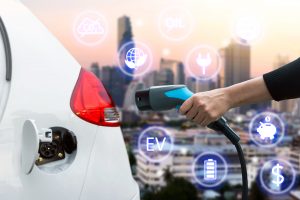 The U.S. Department of Energy (DOE) recently announced $209 million in funding for 26 new laboratory projects focusing on electric vehicles, advanced batteries, and connected vehicles. DOE’s Argonne National Laboratory introduced Li-Bridge, a new public-private partnership to bridge gaps in the domestic lithium battery supply chain. Advanced lithium-based batteries play an integral role in 21st century technologies such as electric vehicles, stationary grid storage, and defense applications that are critical to securing a clean energy future. The projects support goals to make the United States a global leader in electric vehicle and battery innovation; advance the development of these technologies to save families money; lower carbon pollution; and create high-quality jobs.
The U.S. Department of Energy (DOE) recently announced $209 million in funding for 26 new laboratory projects focusing on electric vehicles, advanced batteries, and connected vehicles. DOE’s Argonne National Laboratory introduced Li-Bridge, a new public-private partnership to bridge gaps in the domestic lithium battery supply chain. Advanced lithium-based batteries play an integral role in 21st century technologies such as electric vehicles, stationary grid storage, and defense applications that are critical to securing a clean energy future. The projects support goals to make the United States a global leader in electric vehicle and battery innovation; advance the development of these technologies to save families money; lower carbon pollution; and create high-quality jobs.
New lab projects
The 26 national laboratory projects which received federal funding address four critical goals:
- Significantly reducing the cost and size of next generation battery technology;
- Advancing extreme fast charging to allow for batteries to be fully charged in less than 15 minutes;
- Mitigating potential grid impacts of tens of millions of vehicles being charged across the nation;
- Streamlining cooperative vehicle-to-vehicle communications and controls that reduce energy use and emissions.
The complete list of selected projects is at the DOE’s Vehicle Technologies Office.
Li-Bridge
The Li-Bridge will be led by DOE’s Argonne National Laboratory and work with the national laboratory complex to accelerate developing a robust and secure domestic supply chain for lithium-based batteries. The Federal Consortium for Advanced Batteries will serve as the conduit for engagement with the federal sector.
Li-Bridge alliance industry members join Deputy Secretary of Energy David Turk at a virtual roundtable, Building Bridges Across the Battery Ecosystem, on October 29, 2021.
Consult the DOE for more information.


